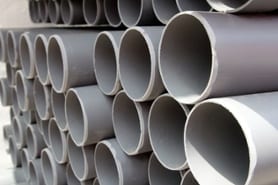 For many years, long before the Pipe Viper was introduced, the fine art of how to bend PVC pipe was somewhat of an acquired skill. Custom fittings were generally produced via a heat bend technique, a process that inserted a device or object into the pipe, and then subjected the pipe to a controlled heat source to bend. Think a drain auger and a heat gun, heating blanket, or hair dryer, for example.
For many years, long before the Pipe Viper was introduced, the fine art of how to bend PVC pipe was somewhat of an acquired skill. Custom fittings were generally produced via a heat bend technique, a process that inserted a device or object into the pipe, and then subjected the pipe to a controlled heat source to bend. Think a drain auger and a heat gun, heating blanket, or hair dryer, for example.
There were a few drawbacks. Heating PVC unevenly or even too high could affect the inner diameter of the pipe or the break down the plasticizer that makes it malleable, leaving it brittle and prone to leaks after it cools. Kinking at the bend was not uncommon, and neither was the excessive waste associated with cutting and fitting pipes. And for those who practiced an open-flame method of bending PVC pipe, there was the release of both HCl (hydrochloric acid) and dioxin, as well as other toxins, all well-known carcinogens.
The Pipe Viper has changed all that. A revolutionary, outside-of-the-box, product by James Spring & Wire Company, an industry leader in spring design and development, the Pipe Viper cold bends Schedule 40 PVC!
Functional, easy to use, and highly efficient, the Pipe Viper is a uniquely engineered, pre-plated carbon steel spring that allows you to easily bend PVC or PVC conduit while maintaining the interior integrity of the pipe. Slide the spring into the PVC pipe and it cold bends Schedule 40 PVC and PVC conduit without kinking or collapsing up to 90 degrees. Save on material costs and time. There are no tees, elbows or couplings needed, and no more gluing or cutting and leaving excess pieces of PVC scattered throughout the job site.
How Important is the Pipe Viper?
PVC (Polyvinyl chloride) is one of the most indispensable materials used in the trades. Lightweight, rigid, durable, and resistant to fire, acids, and bases, PVC is a thermoplastic polymer ideally suited for the construction industry. You’ll find it used in gutters, sprinkler systems, venting, drainpipes, and the like. Its thermoplastic properties provide excellent electrical insulation, too, for use in all types of cabling. The heat bend technique was utilized on jobs to custom fit pipes where needed. As a thermoplastic, PVC can be molded above a specific temperature, which returns to a solid form when cooled. The addition of plasticizers (i.e., di-isononyl phthalate or DINP) softened PVC pipe to the extent that it can bend to 90 degrees without heating, though doing so before the Pipe Viper was problematic as kinking could occur. Yet, the heat bend technique added time and material to meet the installation requirements of custom fitting PVC pipe, and thus always added to building costs.
This is why the Pipe Viper is so revolutionary—it’s able to cold bend flexible Schedule 40 PVC, saving costs on time and material. Schedule 40 PVC is the most widely used PVC. That and Schedule 80 are the two most common types of PVC found on job sites. Schedules of piping are a classification system established as a universal standard for pipe measurements. The system of measurement, its schedule, measures the inner diameter of PVC pipes. Though the outside diameter of a Schedule 40 pipe and Schedule 80 pipe are the same, the latter’s walls are thicker walls and is generally used on jobs requiring high PSI ratings. Just about all other PVC piping needs, Schedule 40 is the preferred material to use.
Schedule 40 PVC
The Pipe Viper cold bends Schedule 40 PVC, keeps its integrity, and maintains its inner diameter. It’s anti-corrosive, lightweight and because it’s engineered from heavy gauge spring steel, its design allows it to bend in any direction. It is the perfect tool for all the trades—electricians, plumbers, data-com techs, alarm system techs, landscape architects and engineers, swimming pool installers, and spa manufacturers, well drillers and any technician or engineer working with PVC or conduit. When it comes to savings and efficiency, the Pipe Viper is about as indispensable as PVC itself.
Contact an expert at James Spring today and save time and money with the Pipe Viper!

